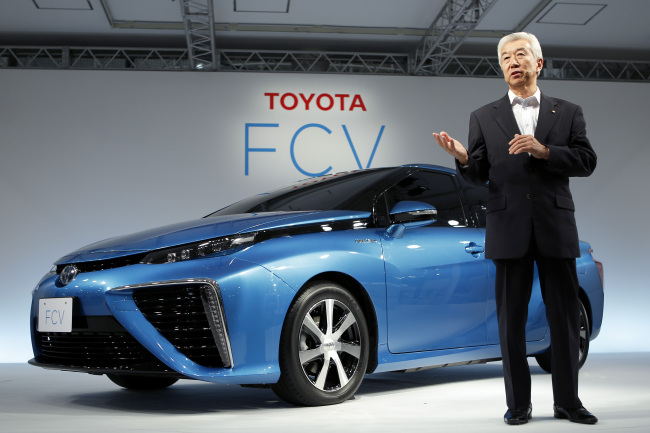 |
Mitsuhisa Kato, executive vice president at Toyota Motor, speaks as he introduces the company’s fuel cell vehicle during a news conference in Tokyo on Wednesday. (Bloomberg) |
Toyota Motor’s vision of a hydrogen future will begin with a $69,000 car.
That’s the price of Toyota’s new fuel cell vehicle, the world’s largest carmaker said in a statement Wednesday. The Camry-sized car will go on sale to Japanese consumers with a sticker price of about 7 million yen ($68,690) before April, followed by debuts in the U.S. and Europe months later, it said.
The car represents the path Toyota will take toward zero emissions, choosing fuel cells over the plug-in electric technologies embraced by the likes of Tesla Motors. The maker of the Prius will join Hyundai Motor Co. in facing the challenge of making these vehicles affordable and easier to use given the lack of refueling infrastructure.
“If there are no charging stations and generous subsidies that lower the transaction price, what’s the point in buying one?” said Koji Endo, an analyst at Advanced Research Japan. “The actual transaction price matters more than the sticker price, so sales will depend on how much they can get in subsidies.”
Toyota is in talks with governments in Japan and other countries on subsidizing the car, Mitsuhisa Kato, Toyota’s executive vice president, said.
Toyota first developed a fuel cell car in 1996, a year before the Prius made its debut in Japan. It has since used the hybrid technology in the Prius by swapping the gasoline engine with a fuel cell stack. Hyundai began offering a hydrogen-powered Tucson crossover via $499-a-month leases this month in California.
While fuel cell cars are propelled entirely by electric motors, like those in Tesla’s $71,000 Model S, they don’t need to be plugged into power outlets to store energy. Instead, hydrogen gas passes through a stack of plastic membranes and platinum-dusted plates to produce electricity. The stacks remain expensive because of the precious metals needed, as do the high-pressure tanks.
Tesla Chairman Elon Musk, 42, has been vocal in his criticism of fuel cell vehicles as being inferior to electric vehicles, even though Tesla partnered with the Japanese company as a supplier for Toyota’s electric-powered RAV4.
“As people probably know, I’m not the biggest fan of fuel cells ― I usually call them ‘fool cells,’” Musk said this month at Palo Alto, California-based Tesla’s annual meeting. In a speech to employees and enthusiasts at a service center in Germany last year, he called fuel cells “a load of rubbish.” (Bloomberg)





![[Exclusive] Hyundai Mobis eyes closer ties with BYD](http://res.heraldm.com/phpwas/restmb_idxmake.php?idx=644&simg=/content/image/2024/11/25/20241125050044_0.jpg)
![[Herald Review] 'Gangnam B-Side' combines social realism with masterful suspense, performance](http://res.heraldm.com/phpwas/restmb_idxmake.php?idx=644&simg=/content/image/2024/11/25/20241125050072_0.jpg)

